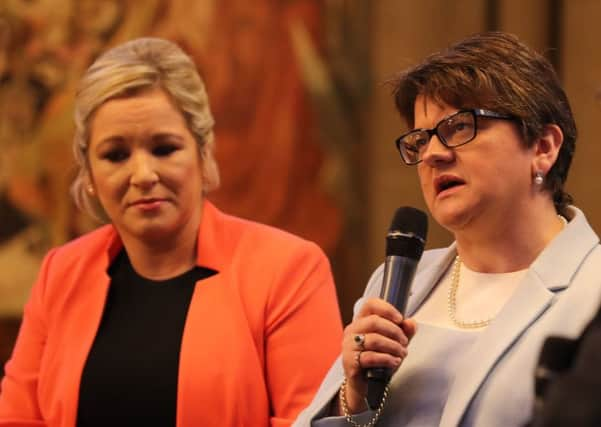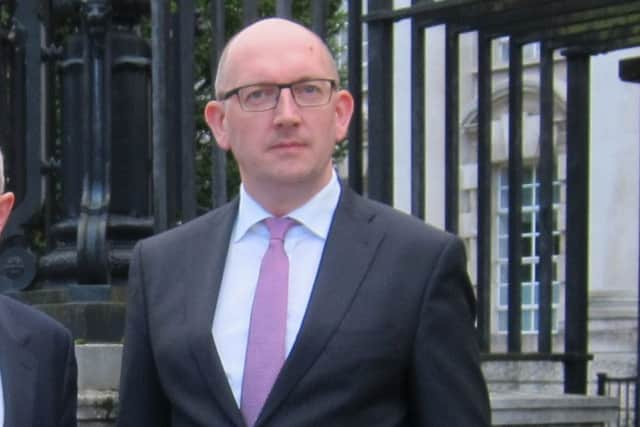Poultry farmer: RHI tariff cuts will be ruinous to our and other businesses


Many businesses, including ours, were encouraged to move away from using fossil fuels and to embrace the opportunity to become greener and more environmentally friendly.
The Kyoto agreement set targets for renewable energy and there were threats of significant fines from Europe if those targets weren’t achieved.
Advertisement
Hide AdAdvertisement
Hide AdIt was decided at the highest echelons in government that it would be better value to offer a Renewable Heat Incentive scheme in GB and make payments to businesses and individuals to encourage the adoption of renewable energy rather than pay the fines.


NI followed suit a year later, having decided to not follow the GB scheme but to appoint their own consultants and roll out a NI specific scheme.
For the first two-three years there was such low uptake that the apportioned monies coming from the GB scheme were not fully utilised and were returned unspent.
The scheme was promoted by the Dept. for Agriculture amongst others and over time momentum built and uptake of the scheme increased rapidly.
Advertisement
Hide AdAdvertisement
Hide AdPrior to the cuts in tariffs in 2017 the NI tariffs were high enough that our business was in a position to meet the financial commitments owed on the monies borrowed after all taxes had been paid with enough left over to cover additional costs associated with renewable heat that we didn’t have previously with fossil fuels and there was a margin of profit left over.
It was an Incentive scheme. Much has been said in the media recently surrounding a 12% target for a margin. European guidelines allow for a margin of between 8% and 22% rate of return with a 12% rate of return to be a target average.
Our business for the first three years was at the top end of this range for the rate of return with the business having an anticipated four-five year payback on the borrowings for the renewable heat system. A four-five yr payback is a 20-25% rate of return and is not uncommon for any business that invests in an asset which depreciates.
This was due to our business having a genuine high heat demand all year round for the production of poultry.
Advertisement
Hide AdAdvertisement
Hide AdThis would have been anticipated by the government department running the scheme and they were aware that larger users of heat would be achieving higher rates of return and smaller users a lower rate of return. The tariffs were set based on averages.
If some businesses chose to produce heat just to earn money then it was the role of the Department and its auditors to monitor and investigate these businesses.
It is unfair and disproportionate to have rushed through a blanket cut in tariffs for all businesses due to a minority.
Our business does not have two sides to it – food production and heat production. The production of poultry and the significant investments in renewable heat are closely interwoven.
Advertisement
Hide AdAdvertisement
Hide AdOne depends very much on the other. Borrowings to install the boilers was raised against the value of land and the financial security offered by a 20 year ‘grandfathered’ and ‘guaranteed’ scheme made it possible to borrow these monies.
The poultry side of the business was profitable even before RHI was introduced and the additional guarantees offered by the scheme allowed for some of the profits from the original side of the business to be used to progress and expand.
In 2017 the government introduced significant retrospective cuts to the tariffs. This was unexpected and abolished any concept of ‘grandfathering’ and ‘guarantees’.
These cuts were rushed through Stormont and implemented with great speed. They were then passed through Parliament in 2018 for an additional year to allow for the government department responsible for the scheme to review the tariffs and make plans for the remaining 17 years of the scheme.
Advertisement
Hide AdAdvertisement
Hide AdThese sudden cuts to the tariffs were unforeseen and dramatically changed the cash flow to our business. We were put into a position where the RHI payments were not sufficient to cover all of the running costs and bank repayments. We had to subsidise our financial commitments out of other farm income.
We understood the reasoning behind the cuts to the tariffs. We knew that they were a knee jerk reaction to the public outcry and the information coming from the PAC.
We acknowledge that there was an overspend and a cost to the NI budget.
We knew that we could weather a year or two at these lower tariffs if it meant that the department in charge could take a year or two and fully investigate the tariffs and would have opportunity to roll out a tariff that continued to encourage and promote a renewable heat scheme but which was also acceptable to the public and was deemed to be good value for money.
Advertisement
Hide AdAdvertisement
Hide AdWe thought that the Department for the Economy would acknowledge the needs of the businesses who contribute to the economy and who helped towards achieving the renewable targets by 2020 equally alongside the needs of their budget.
The 2017 cuts to the tariffs had already achieved their goal – there was no cost to the NI taxpayer. The budget for the RHI scheme had been brought back into line.
Last week the Department for the Economy NI announced that they were going to reduce the tariffs significantly further from the 1st of April.
They will cut the tariffs to 10% of what the original tariffs had been at scheme launch despite all running costs and bank commitments remaining the same.
Advertisement
Hide AdAdvertisement
Hide AdThis will be ruinous not only to our business but to many of the businesses who joined the scheme over the 4 years that it was open.
Business plans were drawn up, repayments on loans were budgeted for and implemented. There was confidence that the scheme would deliver on renewable targets and also that the incentive that was promised to effect such a positive change would continue.
The GB scheme continues unhindered. Had I installed a biomass boiler in GB instead of NI the RHI payments would have been in the region of £20,000 per year.
If I installed a biomass boiler today in GB it would be around £12,000 due to the proper implementation of tiering and degression, two key components removed from the NI scheme.
Advertisement
Hide AdAdvertisement
Hide AdThe current 2017 tariff in NI provides a payment of £13,000 per year. These payments are used to cover the running costs and bank repayments. The European Commission accepts that these are offering a 12% return.
The Irish government is on the cusp of launching their RHI scheme. A boiler there will be in receipt of around £18,000. The European Commission accepts that these are offering an 8% return.
It costs between £14,000-18,000 to run a biomass boiler in NI each year including repaying loans.
When the proposed tariffs comes into effect in April 2019 the RHI payments in NI will be slashed to £2,000 per year but all current running costs and bank repayments remain the same. These further cuts are unnecessary, completely disproportionate and will ruin good businesses.
Advertisement
Hide AdAdvertisement
Hide AdThe fact that the renewable heat has become so interwoven with our overall business means that our entire business is now in jeopardy. Who will ever have confidence in a government guarantee again?
• Tom Forgrave is a poultry farmer from Ballymoney and is a director of the Renewable Heat Association